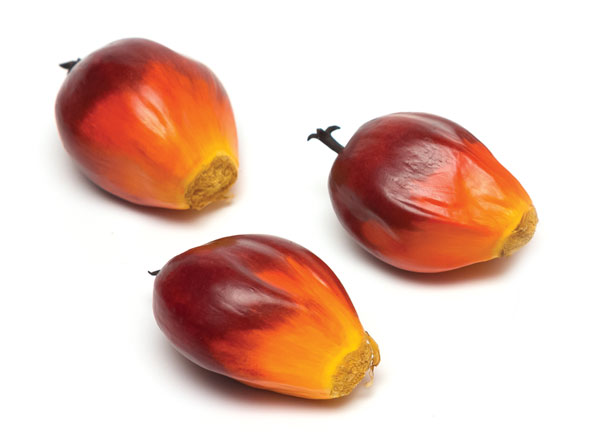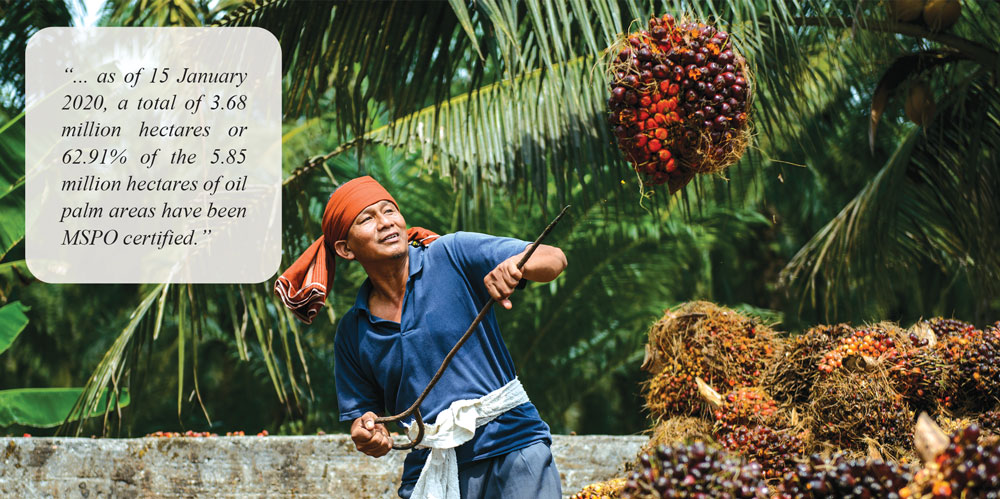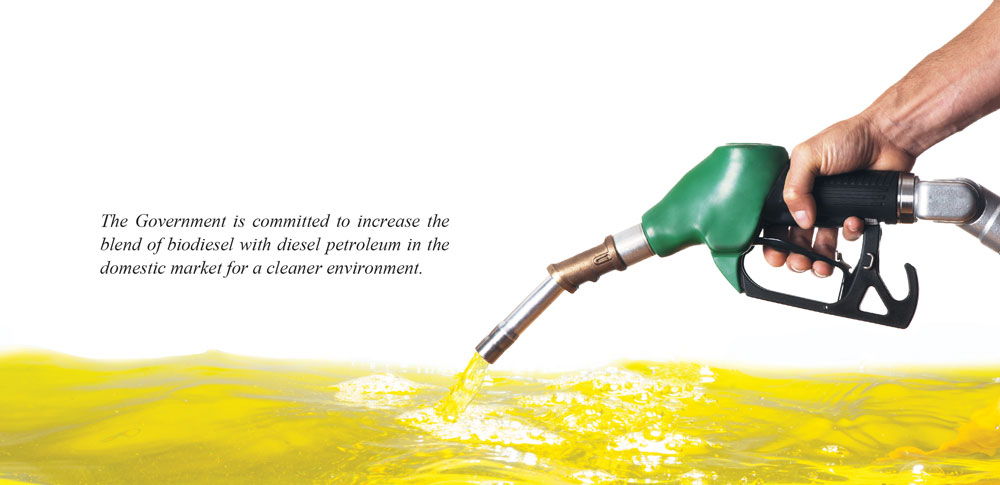




The Hon. Teresa Kok, the Minister of Primary Industries Malaysia officiated the Palm Oil Economic Review and Outlook Seminar 2020 in early January. It was the first seminar for the year deliberating on the performance and outlook of the oil palm industry. In her address, she mentioned that although the sector may foresee challenges, she encouraged Malaysian investors to explore opportunities for investment in both upstream and downstream sectors. Malaysia as the Council of Palm Oil Producing Countries (CPOPC) chair, will work to set new directions to address the numerous issues and challenges and work with member countries to dismantle discriminatory trade measures and promote sustainable palm oil.
“The oil palm industry remains as a significant sector in Malaysia’s economy, contributing 4.5% to the Malaysian Gross Domestic Product (GDP) in 2018. The year 2019 saw a better performance of the Malaysian oil palm industry as evidenced in terms of production and export volume. In terms of palm oil prices, it has charted an increasing trend. The monthly average price recovered from the lowest level at RM1,879.00 a tonne in July to RM2,813.00 a tonne in December 2019. However, low palm oil prices in the first half of the year has resulted in lower export earnings. Hence, the export earnings income of palm oil and its products declined by 5.9% to RM59.0 billion in January to November 2019 compared to RM62.7 billion for the same period in 2018. Nonetheless, export volume increased by 10.9% to 25.7 million tonnes in January to November 2019 against 23.1 million tonnes for the same period in 2018.
Moving into 2020, I am confident that palm oil prices are expected to be firmer supported by favourable factors in the global oils and fats market.
The oil palm industry continues to face various challenges and issues. Challenges such as trade barriers, weakening currency of importing countries, ban on palm oil usage in biofuel by some Western countries and the anti-palm oil campaigns are the many obstacles faced by the oil palm industry. Collectively, the impact will affect the trade of palm oil in the global market.
This year, we foresee more challenges in some of our major markets of the recent development is the imposing restriction by India on RBD Palm Oil in general. Despite these developments, the Ministry will continuously engage these markets including through diplomatic channels to seek amicable solutions to restore market confidence and to further strengthen existing and potential market. Potential new Malaysian Palm oil markets in the middle Central Asian Region such as Kazakhstan and Uzbekistan have steadily increased their imports of Malaysian palm products. Apart from widening market access, Malaysian investors are also encouraged to explore the opportunity for investment in both upstream and downstream sectors in the region.
Other significant potential markets include the African continent, which covers 54 countries with a population of 1.2 billion. Nigeria, South Africa, Mozambique, Tanzania, Kenya, Ghana and Djibouti are among the promising markets in the African continent.
The Middle East countries such as Saudi Arabia, United Arab Emirates, Yemen and Afghanistan are also important markets with growth potentials for the Malaysian palm oil. These countries have a big population but produce inadequate domestic oils and fats. To meet their domestic requirements, the ministry with the collaboration between MPOB and MPOC will continue to intensify efforts to promote Malaysian Palm Oil through trade missions, seminars and interactions with stakeholders abroad.
As the world’s largest palm oil producing and exporting countries, Malaysia and Indonesia are working together to address challenges impacting the industry and unfair treatment related to palm oil trade under the ambit of the Council of Palm Oil Producing Countries (or CPOPC). Both countries, as well as other members nations, are committed to ensure that palm oil is produced and marketed sustainably via respective certification systems. Malaysia as the CPOPC Chair, hope to set new directions to address the numerous issues, and challenges faced by the palm oil industry in the global market. In this regard, the Council is unequivocal on the need for concerted efforts among palm oil producing countries to dismantle discriminatory trade measures against palm oil and promote sustainably produced palm oil.

In ensuring sustainable production of palm oil, the ministry has aggressively pushed for MSPO certification along the supply chain, especially planters, smallholders and oil palm millers. Most importantly, it marks a significant step towards aligning Malaysian palm oil to globally accepted sustainability practices and enhance the branding and image of the Malaysian palm oil.
Through collective efforts of MPOCC and MPOB in implementing certification of MSPO for the industry, as of 15 January 2020, a total of 3.68 million hectares or 62.91% of the 5.85 million hectares of oil palm areas have been MSPO certified. A total of 345 oil palm mills or 76.33% have been MSPO-certified. I would like to reiterate that MPOB will be taking stern action which include cancelling of licences of oil palm growers with 100 acres and above, and palm oil mills that do not comply to MSPO beginning 1 January 2020 under the Malaysian Palm Oil Board (Licensing) Regulations 2005.

Our efforts in promoting MSPO for acceptance in the global market have made a breakthrough through Tokyo 2020 Organising Committee to support the adoption of the MSPO Certification Scheme as one of the sustainable sourcing requirements for palm oil for Tokyo Olympics and Paralympic Games. This recognition is a vote of confidence for our MSPO scheme. Besides, countries such as China and South Korea have also started to recognise MSPO certificate. Across Europe, Malaysia is on track to export certified palm oil to EU countries by 2020 under the Amsterdam Declaration, mainly to the Netherlands, Italy, Denmark, Germany, United Kingdom, France and Norway. The Ministry will continue to engage importing countries to recognise our MSPO as one of its main objective for 2020.
On the other hand, based on the current palm oil price, I would like to urge all industry players especially the millers to take this opportunity to equip their mills with the necessary equipment and facilities to comply with the environmental rules and regulations such as Clean Air Regulation 2014 and biogas trapping facilities to support clean and green energy. As of December 2019, I have been informed that about 220 out of 460 mills licenced under Department of Environment (DoE) have complied with the Clean Air Regulation. I would like to remind that the timeline for the compliance of this regulation ends on December 2021.
The government has successfully implemented national biodiesel mandate in both the transport sector (B10) since February 2019 and the industrial sectors (B7) since July 2019. The implementation of biodiesel programme in the country demonstrates the Government’s efforts towards diversifying the use of palm oil, reducing dependence on petroleum diesel, reducing Green House Gas (GHG) emissions for combating climate change as well as carbon footprint. The blending of palm biodiesel, 10% in the transport sector and 7% in the industrial sector consumes approximately 750,000 tonnes of crude palm oil annually and hence, supports the stabilisation of palm oil prices.
The Government is committed to increase the blend of biodiesel with diesel petroleum in the domestic market for a cleaner environment. In line with that, the Government has allocated RM35 million to undertake the engineering design involving 35 depots to implement the B20 and B30 agenda. I am pleased to announce that the B20 programme for the transport sector will be implemented in stages beginning with Langkawi on 1st January this year. The Government aims to increase the use of palm oil for biodiesel to 1.3 million tonnes annually for B20 programme in the transport sector and B7 programme in the industrial sector.”
